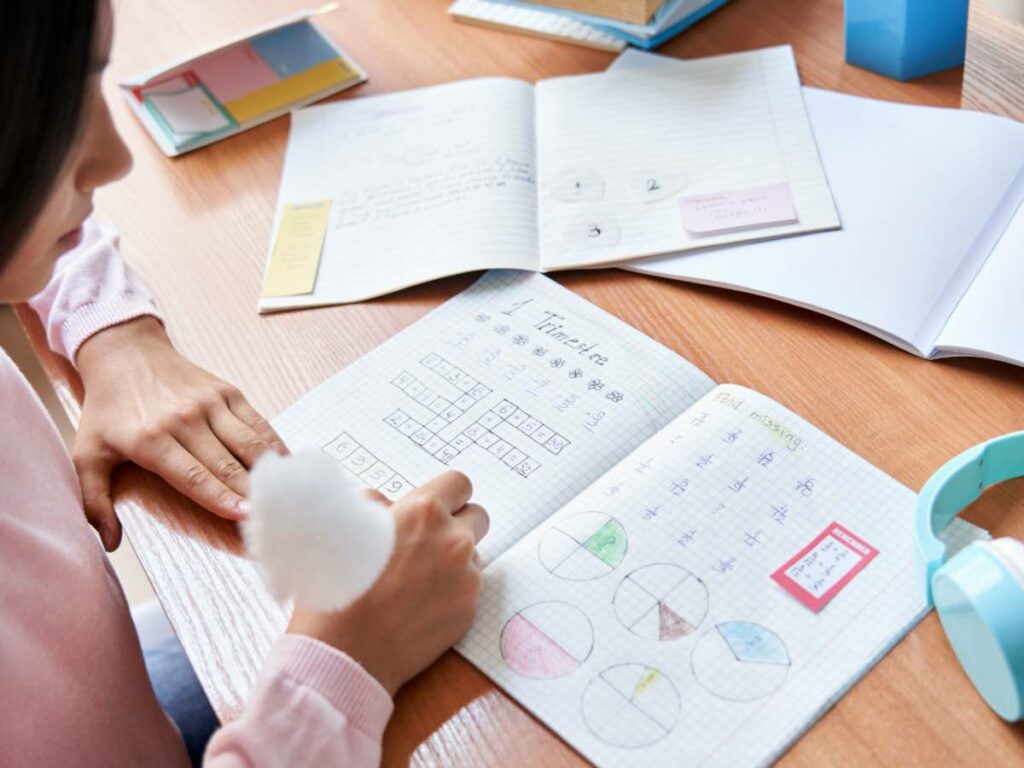Best Time to Study Math
According to scientists, 63% of students find mathematics boring. On the other hand, 58% fear it completely. But the good news is that 82% admit that they are willing to study it.
And speaking of which, just when is the best time to study math if you are one of those students who find it quite challenging?
Various studies show that the best time to study math is at the beginning of the day, either in the first or second class period. In fact, students in early morning math classes tend to perform better than those in afternoon classes. Still, personal preference and environmental circumstances have to be taken into account, too.
Need to raise your GPA to get into your top-choice college but math doesn’t seem to want to cooperate?
In this post, I will provide suggestions on how to develop math study skills that work and can thus help you get better grades in the difficult subject as well as keep you from seeing it as grunt work rather than something that can work to your advantage.

Most Effective Tips to Study Math
Having the textbook, graph paper, a scientific calculator, ruler, protractor and other math must-haves is not enough — you will also need to master those math difficult concepts and principles inside and outside the classroom.
This is when the importance of developing the right math study skills comes in.
Establishing good study habits can help boost not only your competence but also your confidence in math, which means the world if it’s your most dreaded of all your classes.
In addition, it may allow you to cut down on the number of hours spent studying math, thus enabling you to pursue your hobbies and passions and keep you from feeling like you’re enslaved by math.
Below, I will give you the basics of developing effective study skills for math — since each student is different, it’s important to also consider what makes it possible for you to efficiently and successfully study the difficult subject.
Make a study schedule
For many students, the weekends provide larger amounts of time for studying math than do weekdays.
It’s therefore up to you to use your time management and organizational skills to come up with a study schedule that suits your academic and personal pursuits. And, more importantly, come up with one that makes sticking to it easy.
Find a good place to study
Equally important as having a study schedule you will stick to is looking for a place where you can study math with as minimal distractions and interruptions as possible.
It can also help a lot if you will turn off your Wi-Fi (unless you will need the internet to research) and mute the notifications of your smartphone so that you can concentrate fully on the topics to study.
Set realistic goals
To keep studying math from seeming like a drudgery rather than an essential for raising your GPA and increasing your admissions chances, set study goals.
But don’t just come up with any goals — make small and realistic ones that you can actually achieve. Whether you prefer time-based or content-based goals, remember to take breaks, too.
Take practice tests
Wondering why it seems like everything you know about math vanishes into thin air during exams?
Perhaps you’re a part of the 40% to 60% of students estimated to suffer from test anxiety.
As with overcoming many types of fears, an effective way to combat your anxiety about math tests is by taking practice tests repeatedly until you feel more confident.
Summarize concepts and procedures
Here’s a surefire way to solidify just about everything you have learned in math: recapping concepts and procedures using your own words.
You can do it by writing them on a piece of paper or discussing them with yourself. It’s also a wonderful idea to produce flashcards that will allow you to recall things easily and conveniently while on the go.
Reward yourself
Last but not least, promise yourself a reward each time you finish a math study goal. Doing so can help reduce the stress and exhaustion that come with studying as well as encourage you to stick to your study habits.
Rewards can be as small as a serving of your favorite coffee or as big as watching a movie with your friends, depending on the goal attained.

4 Best Foods To You Eat When Studying Math
The so-called brain foods can help make studying math more effective and productive for many students. Leading the list are various types of nuts and berries, which are packed with healthy fats and antioxidants, respectively, the brain needs. Dark chocolate and cocoa products as well as coffee can be helpful, too.
Fueling your brain is, of course, important for you to be able to understand and memorize all those mathematical figures and equations and increase your grade in math, a subject dreaded by many.
But don’t just put any food you can grab in your mouth when gearing up for a math class or exam.
According to health authorities, some foods are proven beneficial for students who need to memorize and understand a lot of pieces of information.
While it’s true that having a healthy overall diet is vital for keeping the brain nourished and ready to take on challenging tasks, experts add that brain foods may be especially beneficial for the promotion of mental performance.
The good news is that many of the brain foods you may consume to help you study math so much better can be found in the average home — yes, some of them could be just waiting to be grabbed by you in your kitchen!
Here are some of the considered top-notchers:
Nuts
Making nuts exceptional brain foods is the fact that they are rich in docosahexaenoic acid (DHA), which is a type of omega-3 fatty acids — healthy fats essential for the body’s proper functioning and health, especially that of the heart.
In babies, DHA is needed for proper brain development. In adults, it helps improve cognitive performance.
Berries
Since berries are packed with antioxidants, it isn’t surprising why they are considered brain foods.
One of the antioxidants in berries is anthocyanin, which helps improve mental performance by boosting brain circulation. It’s also said to promote the formation of neural pathways and improve cellular functions necessary for learning and memory.
Dark chocolate
Hate math?
Then you should love dark chocolates and even chocolate beverages more. Individuals who drank a cocoa beverage regularly performed better on tests.
Some research shows that the intake of cocoa products may help reduce mental fatigue, which can be quite common among students who find math a difficult subject.
Coffee
It’s no secret that coffee helps boost alertness and mental performance, thanks to its caffeine content. Fret not if you are not fond of drinking coffee because it leaves you jittery — scientists at Stevens Institute of Technology say that the scent of coffee alone may help students enhance their performance in math. If you can’t drink it, just smell it!
Best Time of Day To Study Math
Some students eat, sleep and breathe math. On the other hand, there are those that are daunted by it. And if you are one of them, believe it or not, studying math the right way each and every time can make your apprehension about it go away, thus enabling you to ace math exams and increase your math grade and overall GPA.
As mentioned earlier, the best time to study math is in the morning, as per various studies.
But since each student is different in terms of learning style and everyday schedule, too, it’s completely up to you to determine at which particular time of the day you tend to focus on and absorb math-related information the best.
How many hours a week should you study math?
The hours per week students need to devote to studying math depends on how easy or difficult they find the subject. Generally speaking, though, it’s a good idea to study math for at least 2 hours a week per hour spent in the classroom. A 3-unit math class, for instance, requires at least 6 hours of study per week.
Disclaimer: The views and opinions expressed in this article are those of the authors and do not necessarily represent those of the College Reality Check.





